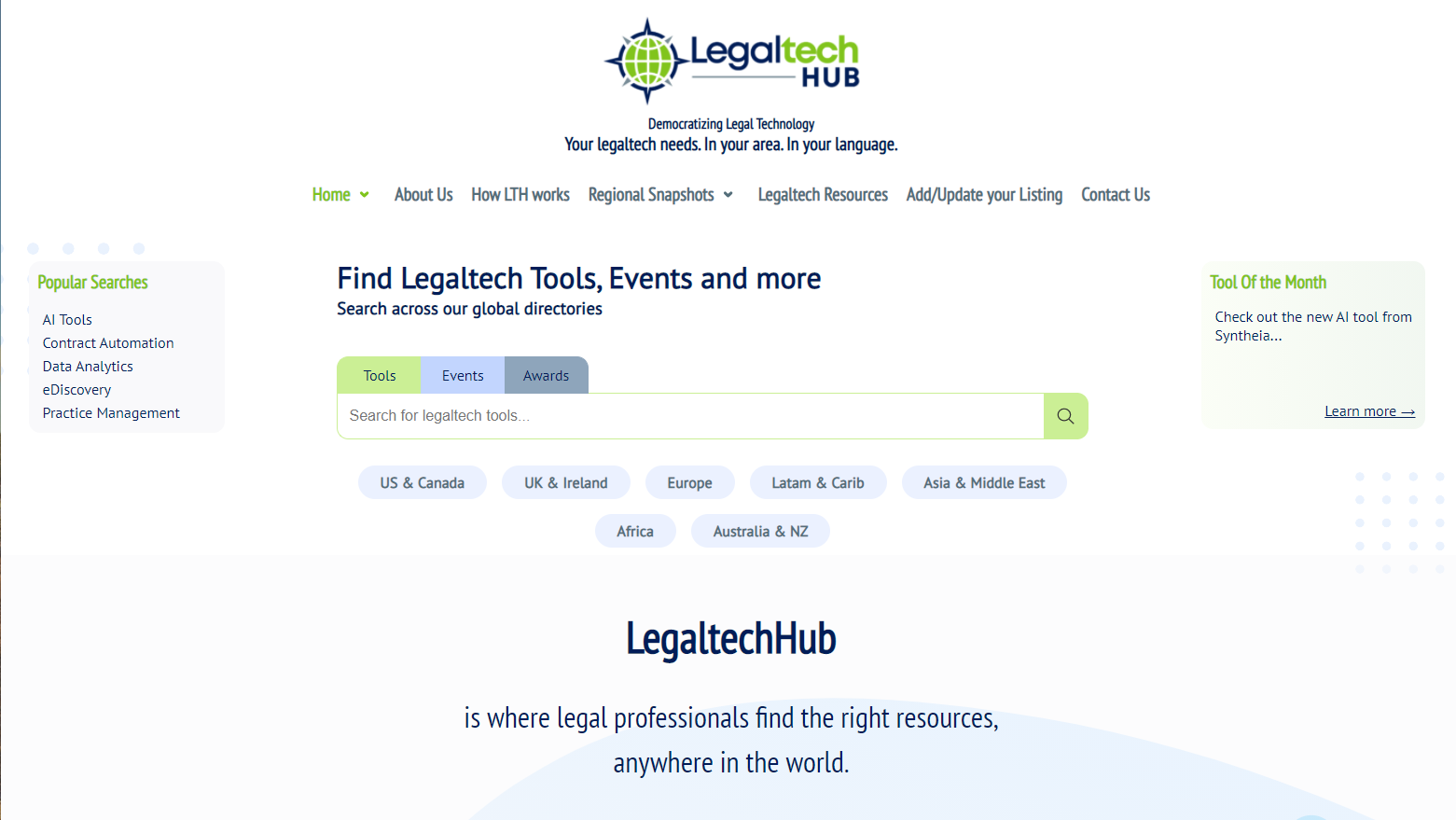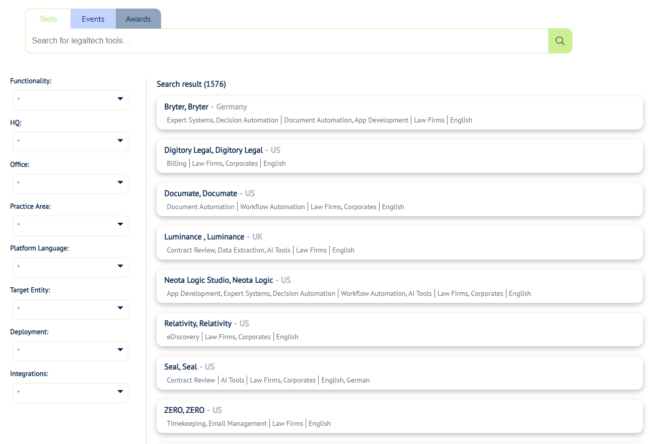A website launching today aims to be the most complete global directory of commercial legal technology, listing legaltech tools, consultants, jobs, events, awards, resources and more from throughout the world in a single, unified resource.
The site, Legaltech Hub, is the creation of the husband-and-wife team of Nicola Shaver and Chris Ford, who developed it as a side project to their full-time jobs. Shaver is managing director of innovation and knowledge at the law firm Paul Hastings. Ford is chief marketing officer at the legal technology company ZERØ.
In August, Shaver, who was recently a guest on my LawNext podcast, was named 2020 Innovative Leader of the Year in the International Legal Technology Association’s Distinguished Peer Awards. In addition, her firm, Paul Hastings, was named Innovator of the Year.
“Our mission is to democratize legal technology,” Shaver told me. In her job at Paul Hastings, she regularly has to search for technology tools, but found there was no easy way to do that. As she talked to others in similar roles around the world, she realized this was a global problem.
Shaver and Ford began working on the site about six months ago, scouring every resource they could find to come up with what they believe is the most comprehensive directory anywhere of legal technology. As of today, it lists 1,581 tools.
The site includes only commercial legal technology, meaning products intended for law firms and corporate legal departments. It does not index access-to-justice, legal marketplace or consumer-facing tools.
Robust Search and Filtering
In addition to its comprehensiveness, a key feature of the site is its robust search and filtering capabilities. Shaver and Ford developed their own taxonomy of 74 legaltech categories — from “ALSP and “App Development” to “Work Allocation” and “Workflow Automation” — to allow users to search for tools with specific functionalities.
Searches can be further narrowed using any combination of eight filters:
- Functionality, including both primary and secondary functions.
- HQ, the country where the vendor is based.
- Offices, countries where the vendor has a physical presence.
- Practice area, the area of law to which the tool is targeted.
- Platform language, meaning both the language of the interface and other languages with which the tool can be used.
- Target entity, meaning whether the tool is for larger law firms, smaller law firms, barristers, corporate legal departments, or small businesses.
- Deployment, whether it is cloud, web or on-premise.
- Integrations, other tools with which it is designed to integrate.
When a user views a particular product, the listing page also shows similar results, pointing the user to other products with similar functionality.
The site will be updated once a month, with new tools added and current listings verified. Later, the site will allow vendors to claim listings for any of their own products and provide updates.
Eventually, product listings will include a rating system and user reviews. Before launching this, Shaver said, they want to be sure they will be able to both verify reviewers and maintain their anonymity.
Other Features of the Site
In furtherance of its mission to be a comprehensive resource for legaltech, the site will eventually include listings beyond just products. Plans for the site include searchable listings of:
- Events. A directory and calendar of legaltech events and conferences throughout the world.
- Awards. Listings of major legaltech and legal innovation awards worldwide, along with submission dates.
- Courses. A directory of legaltech courses, diplomas and degrees available at universities across the world.
- Resources. A directory of blogs, publications, podcasts and more covering legaltech.
- Consultants. A directory of legal consultants, legal engineers, and legal designers across the world, highlighting expertise and jurisdictional focus.
The site also includes a set of regional snapshots designed to provide at-a-glance overviews of what is going on in legaltech in various regions of the world. These snapshots include listings of all legaltech companies headquartered in the region.
Free to Search, Free to List
Shaver and Ford say they want to democratize access to legaltech information and will therefore keep the site free to search and free for companies to list their products.
Eventually, they will enable companies to purchase enhanced listings with features such as videos and email contract information.
They also will sell advertising sponsorships on the site. Further down the road, they plan to add in-depth content that will be accessible on a subscription basis.
The site is launching today with sponsorships from two companies: iManage and Litera. Stephanie Vaughan, global legal practice director at iManage, believes the site fills an unmet need.
“LegalTech Hub fills an unmet need in the legal technology industry, empowering legal professionals to directly identify and learn about the technologies that enable and impact their work most, rather than always having to use their IT teams as intermediaries,” she said.
Julian Morgan, chief marketing officer at Litera, said that anything that helps legal teams discovery the right technology is a good thing.
“The legal tech marketplace is highly fragmented, and there are many solutions that convert manual processes into technology-supported ones,” he said. “This can make it difficult to know what to look for, so taking a directory-style approach makes a lot of sense.”
For Shaver and Ford, a side benefit of building this site has been greater insight into how legaltech tools and markets emerge and evolve around the world.
For that reason, they think this site will also prove useful for startups and emerging companies in legaltech.
“They can get the lay of the landscape,” Shaver said. “They can take a global view.”
Nicola Shaver of Paul Hastings, ILTA’s ‘Innovative Leader of the Year’
 Robert Ambrogi Blog
Robert Ambrogi Blog
